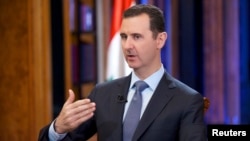Syrian President Bashar al-Assad said that he has no problem with international chemical weapons experts coming to inspect the sites where Syria makes and stores its chemical arsenal.
In an interview with China's state-run CCTV, Assad said the only challenge is ensuring safe access to those areas, warning that "terrorists" could pose a security threat. He suggested fighters could obstruct the experts in order to get the government blamed for violating its agreement to allow them in.
Syrian officials use the word terrorist to describe rebels who have been trying to oust Assad in the country's 18-month conflict.
The president acknowledged Syria has a "large" chemical weapons stockpile built up during decades of manufacturing, but that it is safely under government control.
"Any army stores chemical weapons under special conditions to prevent any terrorist or other destructive forces from tampering with them, that is destructive forces that could come from other countries. So there is nothing to worry about. The chemical weapons in Syria are in a safe place that is secure and under the control of the Syrian army," said Assad.
The Syrian government has accused rebels of using chemical weapons several times, including in a deadly attack last month in the Damascus suburbs.
That attack drew international condemnation, with the United States, France and Britain saying evidence pointed to pro-government forces carrying out the attack.
Syria has publicly agreed to give up all of its chemical weapons by the middle of next year.
Russia, a Syrian ally, has accused the U.S. of trying to "blackmail" it into letting the U.N. Security Council authorize force against Syria if Assad's government does not follow through with the plan.
The United States and its allies have been pressing the Council to adopt a Syria resolution under Chapter 7 of the U.N. Charter, which would permit enforcement through military action.
Russian Foreign Minister Sergei Lavrov said on Sunday U.S. officials told him that if Russia does not agree to a Chapter 7 resolution, Washington will block the Organization for the Prohibition of Chemical Weapons from helping to remove Syria's stockpiles.
Russia and the United States made a deal earlier this month for the Netherlands-based international body to monitor the disposal of all chemical weapons in Syria.
In a statement sent to VOA, a State Department official said U.S. diplomats are drafting a U.N. Security Council resolution with the "strongest possible enforcement mechanism" to ensure Syria's disposal of the stockpiles.
The official said Washington will not negotiate the details in public and that U.S. Secretary of State John Kerry spoke with Lavrov on Sunday and "reiterated the importance of working together" on their recent agreement about the need to destroy Syria's chemical weapons. There was no direct U.S. response to Lavrov's allegations of blackmail.
Russia has long opposed Western threats of sanctions or force against Assad's government.
OPCW said Saturday the Syrian government provided it with an inventory of its chemical weapons as part of the U.S.-Russian deal. OPCW said its "technical secretariat" was reviewing the information.
In an interview with China's state-run CCTV, Assad said the only challenge is ensuring safe access to those areas, warning that "terrorists" could pose a security threat. He suggested fighters could obstruct the experts in order to get the government blamed for violating its agreement to allow them in.
Syrian officials use the word terrorist to describe rebels who have been trying to oust Assad in the country's 18-month conflict.
The president acknowledged Syria has a "large" chemical weapons stockpile built up during decades of manufacturing, but that it is safely under government control.
"Any army stores chemical weapons under special conditions to prevent any terrorist or other destructive forces from tampering with them, that is destructive forces that could come from other countries. So there is nothing to worry about. The chemical weapons in Syria are in a safe place that is secure and under the control of the Syrian army," said Assad.
The Syrian government has accused rebels of using chemical weapons several times, including in a deadly attack last month in the Damascus suburbs.
That attack drew international condemnation, with the United States, France and Britain saying evidence pointed to pro-government forces carrying out the attack.
Syria has publicly agreed to give up all of its chemical weapons by the middle of next year.
Russia, a Syrian ally, has accused the U.S. of trying to "blackmail" it into letting the U.N. Security Council authorize force against Syria if Assad's government does not follow through with the plan.
The United States and its allies have been pressing the Council to adopt a Syria resolution under Chapter 7 of the U.N. Charter, which would permit enforcement through military action.
Russian Foreign Minister Sergei Lavrov said on Sunday U.S. officials told him that if Russia does not agree to a Chapter 7 resolution, Washington will block the Organization for the Prohibition of Chemical Weapons from helping to remove Syria's stockpiles.
Russia and the United States made a deal earlier this month for the Netherlands-based international body to monitor the disposal of all chemical weapons in Syria.
In a statement sent to VOA, a State Department official said U.S. diplomats are drafting a U.N. Security Council resolution with the "strongest possible enforcement mechanism" to ensure Syria's disposal of the stockpiles.
The official said Washington will not negotiate the details in public and that U.S. Secretary of State John Kerry spoke with Lavrov on Sunday and "reiterated the importance of working together" on their recent agreement about the need to destroy Syria's chemical weapons. There was no direct U.S. response to Lavrov's allegations of blackmail.
Russia has long opposed Western threats of sanctions or force against Assad's government.
OPCW said Saturday the Syrian government provided it with an inventory of its chemical weapons as part of the U.S.-Russian deal. OPCW said its "technical secretariat" was reviewing the information.





